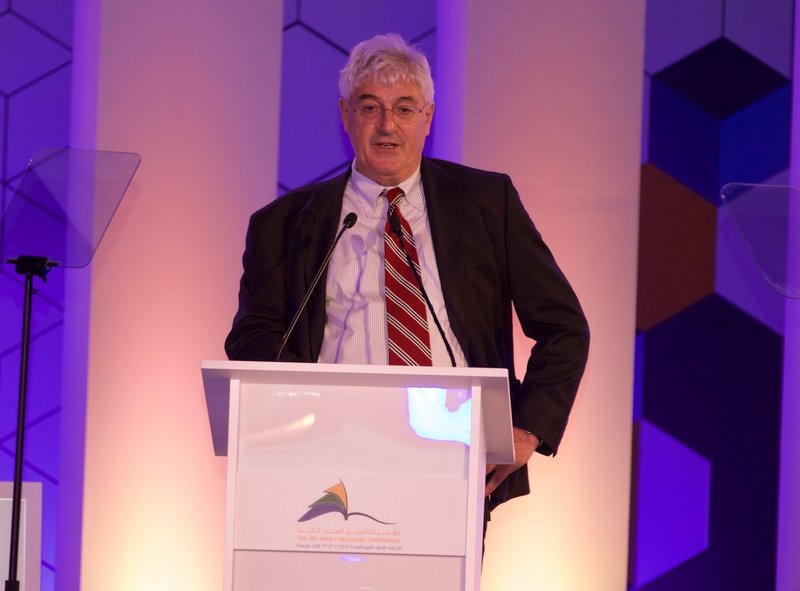“Your Highness, Sheikh Dr. Sultan Bin Muhammad Al Qasimi, Ruler of Sharjah. Your Excellencies, Ladies, Gentlemen, friends, colleagues, competitors.I am honoured and delighted to be attending the Arab Publishers Conference for the second time. It is particularly important for me wearing my relatively new hat as President of the International Publishers Association (IPA). Our two associations share a number of members and in very recent times IPA has been able to welcome the publishers associations of Saudi Arabia and Tunisia as full members and Jordan as a new provisional member. I hope there will be many more in the future.
Publishing is facing what the Chinese call ‘interesting times’ as we learn to cope with digital disruption, new and powerful technology entrants whose aims and objectives are very different from those of traditional publishers, and Governments of all persuasions who recognise the importance of publishing in education, culture, research and creativity but quite like to tinker with it.
In addition, as evidenced by today’s ghastly news from Bangladesh, publishers are under threat of violence, worldwide.
Now, more than ever, publishers across the world need to stand together, to learn from each other, to ensure that the value of their authors’ labours are not undermined, and that readers can have maximum access to books, illustrations, journals and knowledge hubs – in other words access to the world of opportunity.
Conferences like this and like the forthcoming IPA Congress organised in partnership with the UK Publishers Association and the London Book Fair just before the London Book Fair in April next year are vital to ensure greater understanding of each others’ issues and being able to obtain or offer support. Our businesses are based on commerce, which is their strength; and commerce, particularly international commerce, is based on communication and trust.
The Arabic publishing community is well used to disruption, unfortunately all too frequently, but that also gives it the flexibility and strength to adapt to new conditions such as digital technology. The youth in the Arab world are more than digital natives, they are digital junkies (as are my grandchildren). We need rapidly to expand what we offer them so that the technology can deliver quality as well as quantity.
Arabic is the fifth most spoken language worldwide with over 200 million native speakers. Yet translation to and from Arabic is far less than is surely possible. The efforts of Kalima and the Sharjah International Book Fair Translation Grant Program here in UAE and of the Bloomsbury Qatar Foundation, which has delivered nearly 200 Arabic and English titles since 2010, may be turning the tide, but so much more could be done and, I suspect, will be done.
I want to touch on a sensitive matter, freedom to publish. At the recent General Assembly of the IPA held during the Frankfurt Book Fair our members had some difficult choices to make about some member applications. Our statutes require members to support the two fundamental pillars of our organization: support for copyright and support for freedom to publish. The former is vital. Without copyright we and our authors have no businesses and readers will have little or no choice of what to read. There was no dispute that all the associations applying to join were able to show their utter and complete commitment to that.
The second pillar is equally important but trickier. Different cultures operate in different ways. One person’s freedom can be interpreted as another person’s crime. The IPA is not there to judge a country’s policies but it is there to support publishers associations in those countries where they are struggling against abuses. Of course these things are not black and white. We live in an age of complexity and ambiguity and some of our members believe that membership of IPA gives unjustified legitimacy to some regimes. I disagree and was delighted that all the applications were accepted by a majority in a democratic vote. We shall, of course, be monitoring our new members to ensure they comply with our principles by means of a number of measures but my view is that engagement gives us a chance to support our colleagues whereas non-engagement brings nothing. Fortunately most IPA delegates agreed but we must work to show that things can change.
At the risk of embarrassing her, her Excellency, Sheikha Bodour’s impact on Publishing in this region and her impact on the IPA itself has been immense and is an example to us all. That there is a session tomorrow on Freedom to Publish is a good sign.
I would like to thank the Arab Publishers Association for having this conference and the Emirati Publishers Association for hosting it, and for the Sharjah International Book Fair for doing so much to promote reading and publishing. As I said at the beginning, I am honoured to be here.
Thank you.”

